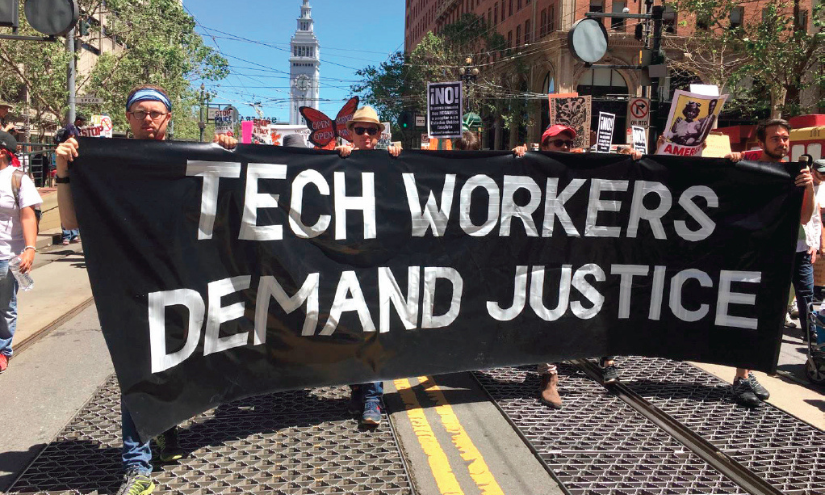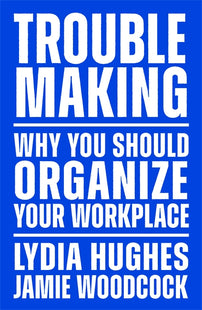Why should white-collar workers unionise?
Anti-union rhetoric is so successful that it has some of us thinking that unions ‘just aren’t for us’.

While there are powerful examples of organizing with precarious workers, troublemaking should not be seen as limited to low-paid work. We have each heard many times from workers in both blue-collar and white-collar jobs that ‘things aren’t really so bad here’ or maybe that ‘it would be better for me to help someone else who has worse conditions than mine’. Those in ‘good’ jobs may perceive themselves as having much more to lose by organizing. Workers may have a more friendly relationship with management or currently enjoy some benefits at work. We very rarely talk about stable work also being a potential barrier to organizing. However, it too can potentially create a mindset that can damage organizing efforts.
Anti-union rhetoric is so successful that it has some of us thinking that unions ‘just aren’t for us’. Those of us who have more ‘professional’ or white-collar jobs have been tricked into thinking that the way we can get ahead is through negotiating on our own. This might be by doing well in performance reviews, well-worded emails and asking nicely.
Whether this comes from arrogance or a sense of superiority – or from never having won anything collectively – it undermines the idea of a union. For some, negotiating on their own may well reap rewards – although through pay inequality data we know this will mostly not be the case for women and people of colour. It may get us a pay rise here or there, but it does not build power and it certainly does not win big. Kickstarter is an online platform that hosts campaigns for crowdfunding, often involving creative projects.
After Kickstarter workers started a union drive, the CEO published a statement. Aziz Hasan, the CEO, explained that ‘the union framework is inherently adversarial. That dynamic doesn’t reflect who we are as a company, how we interact, how we make decisions, or where we need to go. We believe that in many ways it would set us back, and that the us vs. them binary already has.’
However, that binary already exists in the workplace by the very nature of the employment relation – the economic relationship of work is adversarial, between workers and the boss, whether there is a union or not. The boss might be a lovely person or horrible. You may get on really well with them or not. This is not what creates an adversarial dynamic; rather, it is the different interests that each side has. The interests of the boss lie in a division of labour that rests on exploitation. Bosses in many professional jobs have tried to convince us that because we work in an office instead of a factory, the relationship has somehow changed. They may claim that the greater responsibilities or say over parts of our work mean that we all share the same interests. This sort of argument has been weaponized by bosses to try and prevent worker organizing before it even starts. ‘Unions are adversarial’, they claim. ‘They will disrupt the workplace and relations in it.’ ‘Unions are only appropriate for workers in some kinds of work or with particular problems’, and so on.
Such arguments are common in the tech industry, especially in the US. As the Kickstarter workers launched their campaign, the leadership of the company waged a covert war against them. They tried to use a nuanced argument, spreading the idea that ‘we support unions, just not here’. This idea of union-focused NIMBYism is common. NIMBY – aka not in my backyard – is a phenomenon where people may support something generally, but not if it affects them directly. For example, someone wants a phone signal, but not a phone mast near their house. Bosses exhibit classic union NIMBYism when claiming to be progressive and pro-union in general, but they are against the idea of specifically giving up power to workers through a union at their company.
Union NIMBYism spread through Kickstarter management – and workers, too. As a generally progressive workforce, of course they supported ‘blue-collar workers’ having a voice and a union. But Kickstarter very effectively created the illusion that unions were not for tech workers. At one point, they even weaponized the language of ‘privilege’ and ‘appropriation’ against them. Three co-workers sent round an email claiming that they were ‘concerned with the misappropriation of unions for use by privileged workers, some of whom receive compensation more than twice the average income in NYC’.
Despite management’s statement that unions were a good force in the world, at the regular ‘all-hands’ meetings, the management would bombard workers with anti-union messages. They also tried positive persuasion: All of a sudden they were available for one-on-one friendly chats, trying to make anyone feel that they could raise issues, and they threw lavish parties to celebrate the company. The issues of apathy and individualism also came up at Kickstarter. This is common across all fields, when someone looks at their own conditions of work, does not see anything wrong and so assumes there is no need to organize for changes or to have a union. On the surface this may seem fair, but it fundamentally misses the point of the union: power and solidarity.
If we start with solidarity, not everyone in the union needs to be outraged at their own issues, conditions or pay. However, they must be willing to support those who are. In any workplace, bosses may try the age-old tactic of divide and rule. They might give more to one group of workers but not others. This could be higher wages, more security or power. It could even just involve treating them differently. For those workers without immediate issues, the task is to look around, see who else is struggling and add your voice to theirs and amplify it. This might be a person you work closely with, the person who cleans your office at night, does the customer service, and so on. In many cases, this aligns with oppression in the workplace. Men, and mostly white men, are likely to have more power or security in a white-collar workplace, whereas those who have been historically marginalized benefit most from strong collective solidarity.
Organizers battled the three common factors found in ‘good’ jobs; apathy, union NIMBYism and the ‘things aren’t so bad’ mentality. Management developed these narratives and bombarded workers with them at regular all-hands meetings, with the help of an expensive PR firm hired to help them win the conflict. Despite the seemingly endless onslaught from management, organizers persisted. They tirelessly talked to their co-workers, organized with creators on the platform and spoke up at all-hands meetings. After a year of organizing, it was time to vote to form a union. Workers visited a conference room at the New York office one by one to cast their ballot, overseen by observers from the union and management. One worker commented that it was the first time they had ever voted on anything in the workplace, their first bit of true democracy on the job.
Organizers gathered at their local office of the National Labor Relations Board (NLRB) in Brooklyn to listen to the count. As if choosing the most dramatic way to read the votes possible, counters produced votes one by one, parading them to the room and pronouncing which way the person had voted. ‘Yes . . . yes . . . no . . . no . . . no . . . no.’ Despite what seemed like an impossible number of ‘no’ votes, they won. After getting a majority of ‘yes’ votes, they now legally had to be recognized by their bosses as a union. Organizers poured onto the street, singing ‘Solidarity Forever’.
This victory came in February 2020, just weeks before all our lives got turned upside down with the onset of the Covid-19 pandemic. Facing huge redundancies, the union successfully negotiated much improved redundancy packages – going from two weeks’ severance for every year of tenure to ‘4 months of severance, 6 months of health insurance coverage, 4 months of coverage for workers making over 110k . . . no non-compete clause, no non-solicitation clause, and . . . ensured recall rights so if the company wants to reopen these roles within the next year, they’ll need to offer the spots to laid off workers first’. Clarissa Redwine, a former Kickstarter employee, said ‘this situation is exactly why having a union, and sustained, organized, collective, worker power is better than one-off concessions.’
While the union won workers such huge improvements in redundancy packages, it was bittersweet. A full 40 percent of Kickstarter workers were made redundant, seriously taking the wind out of the workers’ sails. Organizers noted the bright side, though: workers from Kickstarter will likely wind up at so many different tech companies, spreading the word about unions further than they ever could before. Their victory at Kickstarter had shown not only that it was possible to have a union but why it was needed. They effectively fought the common misconception that collective action at work is only for ‘low-skilled’ or blue-collar workers and that unions are only for changes in terms and conditions. They showed that campaign goals should be far higher than how much we are compensated for work, but also about what happens at work. Workers who once fought against having a union at Kickstarter, when seeing its value in the redundancy process, changed their minds.
When reflecting on the process of unionizing and facing the frustrations of the NLRB process, one worker said, ‘real labour justice comes from constant political activity and striking. Period.’ While these stories provide examples of where we have won, many still think ‘we can’t win big’. Even when the organizing gets underway, there will be many moments that you might think quietly to yourself that it is not possible or that it is just too hard. The bosses have resources, often plenty of them, while we may not have many. But even the biggest giants have their vulnerabilities. They all care about something that we have the power to disrupt. Whether that is their profit, their reputation, their shareholders or their festive party – by mapping and exploiting these weak points, anything is possible. In other words, we have got to be prepared to be troublemakers and take action to win big things.
Watch the authors of Troublemaking in conversation with union organisers and activists working on the ground!
[book-strip index="1"]
